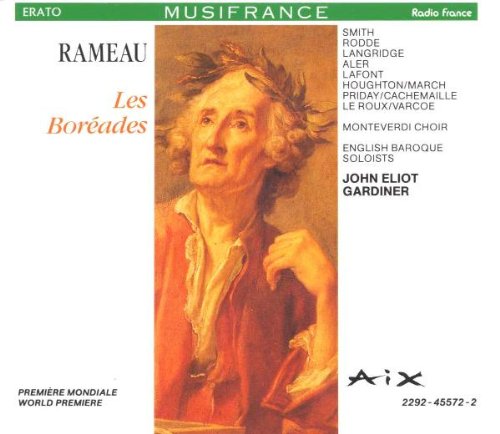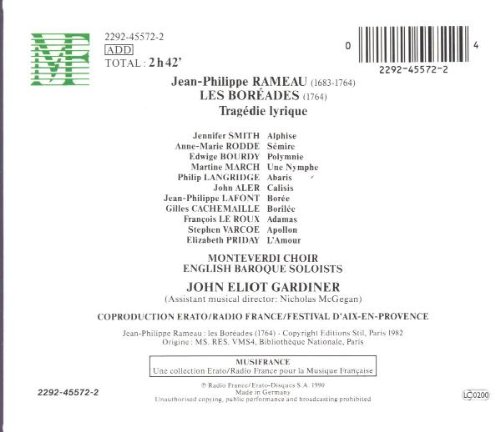Customer Services
Copyright © 2025 Desertcart Holdings Limited



Rameau: Les Boreades / Gardiner
K**R
Maybe my favorite opera recording
and I have them all. This is just a rip from start to finish. I don't know how the reviewers don't single out John Aler, in "Jouissons de nos beaux ans", which is everything great that vocal art can do, a thrill a minute. I don't believe this is an acquired taste, it's just too marvelous for words. From this I went on the as much Rameau as i can find, Platee at City Opera, Zoroastre by Christie in Brooklyn and Pichon in Aix, Hippolyte Christie in Brooklyn again and just this year a fine production at Juilliard, and Boreades in Brooklyn with Christie. Christie is the theme, I guess, as wonderful as Gardiner's contribution, Christie did the whole thing with the period productions from Les Arts Florissants. A world to cherish.
C**D
See this at BAM in June!
Delightful musical surprises await you in this "lost" opera by Rameau. If you are in the NYC area, do not miss the few June performances at BAM. I saw William Christie's production (dir. Robert Carsen & dance by Edouard Lock) 3 times here in Paris and it was superb.
B**D
1982 Analogue Recording of Rameau's Last Great Work
Jean-Philippe Rameau (1683 - 1764): Les Boréades. Tragédie lyrique. Performed by: Jennifer Smith (soprano, Alphise); Anne-Marie Rodde (soprano, Sémire); Edwige Bourdy (soprano, Polymnie); Martine March (soprano, Une Nymphe); Philip Langridge (tenor, Abaris); John Aler (tenor, Calisis); Jean-Philippe Lafont (bass, Borée); Gilles Cachemaille (tenor, Borilée), Francois LeRoux (tenor, Adamas); Stephen Varcoe (bass, Apollo); Elizabeth Priday (soprano, L'Amour); the Monteverdi Choir; the English Baroque Soloists; directed by John Eliot Gardiner. Recorded in July 1982 at the Festival International d'art lyrique et de musique, Aix-en-Provence, France. Released in 1990 by Erato Disques (Warner) in a 3-CD box as 2292-45572-2. Total playing time: 160'42". (64 page booklet with black and white photographs from the Aix-en-Provence performances)That this recording exists at all, is due to the persistence of John Eliot Gardiner, who worked out a performing version from the surviving manuscript as early as 1975. The original opera, written by Rameau when he was in his eighties and never performed in his lifetime (the composer died during rehearsals and the planned performance was abandoned), had been forgotten for over 200 years, and all attempts at actually getting it on stage appear to have been dogged by bad luck. Even this recording, which needed eight years between the recording sessions at Aix-en-Provence and its release in 1990, is not without its problems. The biggest seems to be the fact that the French publishing house which owns the copyright to the libretto refused to allow it to be translated - and demanded an extortionate fee on each box sold if the French libretto was printed in the booklet. In the end, Erato decided to do without, and have instead printed a summary of the plot (which is not keyed to the track numbers but can, with a little effort, be fairly easily followed). Another problem appears to have been the recording venue, which leads to a certain amount of echo. The balance between the singers and the orchestra is not always ideal, and there are differences in sound between different parts of the opera. However, all told the engineering is acceptable - certainly better than what you would get on a budget label, I imagine.Like practically all Rameau's stage works, the storyline here is based on Greek mythology. The "Boréades" of the title are two male descendants of the god of the north wind (Boreas) who lay claim to the hand of the Queen of Bactria, Alphise, and to the kingship. Alphise, however, is in love with Abaris, a mysterious stranger who has been brought up in the temple of Apollo. When Alphise comes out into the open and declares her love for Abaris, the two sons of Boreas call on him to wreak revenge. There is a freak storm, and Alphise is carried away into Boreas's kingdom (which some think may have been Britain, although that is highly unlikely). Abaris follows her and manages to silence Boreas and his two sons by using a magic arrow given to Alphise by the god of Love. If all this sounds rather stupid and superficial, it is just that - the plot seems to be there only as a rather flimsy excuse for lots of dancing, divertissements, appearances of gods, wonderful stage-effects (clouds, winds, etc.) - and some lovely singing, I should add. Jennifer Smith as Alphise is very much at home in this kind of repertoire, and her stylish singing helped me to excuse the occasional hardness of her timbre. The real "stars" of this performance are, however, Philip Langridge (Abaris) and Gilles Cachemaille (Borilée, one of the two pretenders to the throne). Both have plenty of opportunity to shine and do so with delightful voices, rather outshining the other male contributors. Of the smaller female roles, it is Annemarie Rodde as Sémire, a confidante of Alphise, who can create the best impression with her Act 1 air, "Un horizon serein". The Monteverdi Choir is, as usual, exquisite; the playing by the English Baroque Soloists at this period does not quite match up to that on later Rameau recordings by Marc Minkowski's Musiciens du Louvre, but is still wonderful to listen to. There are plenty of very well-known "HIPP" musicians to be heard here, including Lisa Beznosiuk with some great flute playing and Nicholas McGegan on one of the two harpsichords.French baroque music is often considered "mannered", and personally I think Rameau's operas are definitely an acquired taste - they "reek" of the late Ancien Régime and its decadence. But musically they are always full of interesting details and surprises - as Gardiner points out in his essay, the octogenarian composer was not above introducing clarinets for the first time here.
M**O
Magnificient avant-garde late Baroque masterpiece
This work undiscovered until the late 1970's lay hidden in the Bibliotheque Nationale of Paris unperformed during Rameau's lifetime or at other time after, incredible!. This recording is therefore a world premier recording. The instrumental writing is truly avant-garde. It is a very complex work and probably represents together with Rameau's first opera, Hippolyte et Aricie one of his two greatest works. That his last opera (this one) and first should be his masterpieces, may be explained by the fact that he did not want to push the tastes of the Paris public too much and only at the end of his life did he feel secure about writing what was really in his mind and what he wanted to write after Hippolyte et Aricie, but which at that time did not seem to him to be what the middle class Paris public wanted, or would accept. So we should be thankful that he did at the end of his life return to his intentions of the first part of his life. It may be the first time that clarinets have been scored before the Mannheim classical/pre- classical period and included in an extended orchestral work before W. A. Mozart. Thus the work pre-figures the classical symphonic form. The scoring is very complex and magnificient, it is full of exquiste dance forms and great and rich orchestral color. The singing of the chorus is sublime and the soloists are all very fine. This is one of the all time baroque masterpieces. There is no libretto included because it is still under copyright, but is available from the publisher Stil Editions Paris for a fee. If you want only one Rameau opera this is it, if you want two masterpieces then this performance and Hippolyte et Aricie under Minkowski Rameau - Hippolyte et Aricie or the version directed by Christie (my choice) Rameau: Hippolyte et Aricie are my suggestions. Rameau - Hippolyte et AricieRameau: Hippolyte et Aricie
Trustpilot
5 days ago
1 month ago